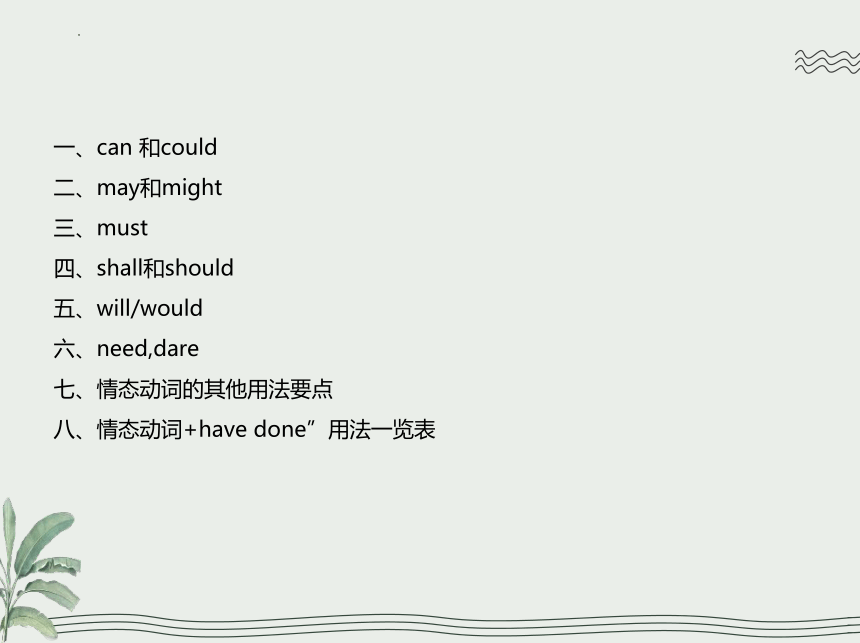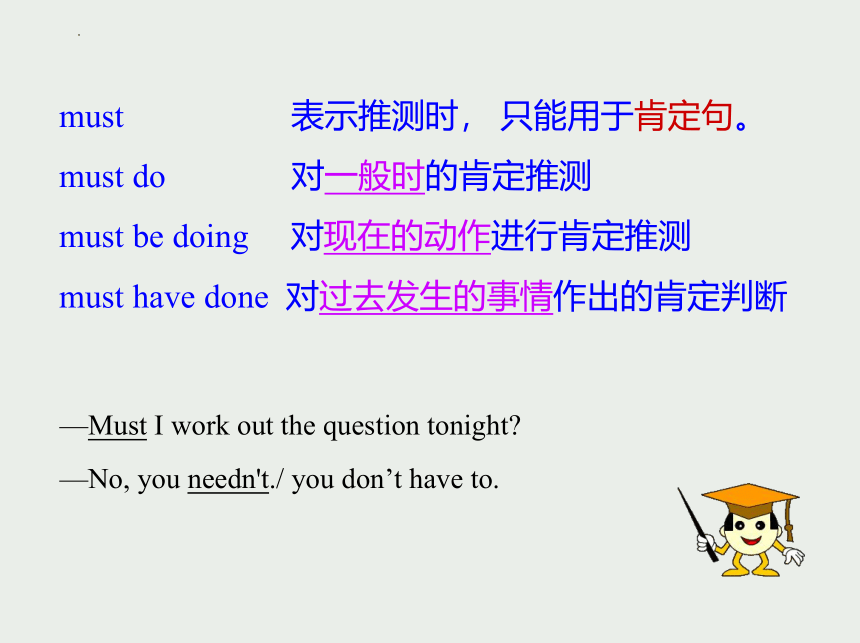2023届高考英语语法专项:情态动词课件(17张ppt)
文档属性
| 名称 | 2023届高考英语语法专项:情态动词课件(17张ppt) |  | |
| 格式 | pptx | ||
| 文件大小 | 937.5KB | ||
| 资源类型 | 教案 | ||
| 版本资源 | 通用版 | ||
| 科目 | 英语 | ||
| 更新时间 | 2022-12-02 19:06:32 | ||
图片预览







文档简介
(共17张PPT)
高考
英语
情态动词
一、can 和could
二、may和might
三、must
四、shall和should
五、will/would
六、need,dare
七、情态动词的其他用法要点
八、情态动词+have done”用法一览表
表示能力
表示可能性
表请求或允许
一、can 和could:
1) can的主要用法:
A. __________:
eg. The girl can dance very well.
B. ____________:
eg. Can the news be true
C. _____________:
eg. Can I sit here
2) could的主要用法:
A. could 是can的过去式, 表示过去的能力和推测
eg.She couldn’t be telling lies.
B. could可代替can表示请求, 语气比can更委婉
肯定 否定
can/could have done can/could not have done
“本可以、本可能做某事” 表示对过去发生的事情作出的判断。
对过去发生的行为进行推测:
不可能做了某事
might/may have done
表示对过去发生的动作进行表示可能性的推测。
—May I use your car
—No, you mustn't.
may表示“可以”时,其否定式常用mustn't,表示禁止。
(委婉地拒绝用“Sorry, but I am using it now.”
或“You'd better not.”)
二、may和might
might 的用法:多在间接引语中表示过去的可能和允许。
表示必然性。
表示强制/义务。
三、must
must 的主要用法:
1. _____________
eg: We must all die.
2. ______________
eg: You must get up early.
must 表示推测时, 只能用于肯定句。
must do 对一般时的肯定推测
must be doing 对现在的动作进行肯定推测
must have done 对过去发生的事情作出的肯定判断
—Must I work out the question tonight
—No, you needn't./ you don’t have to.
四、shall和should
shall
①用于第一人称的疑问句中,表示征求对方的意见。
Shall we go to the theatre by bus
②用于第二、三人称的陈述句中,表示说话人给对方的命令、警告、允诺或威胁。
—Will you read me a story, Mummy
—OK. You shall have one if you go to bed as soon as possible.
③表示法律、条文中的规定“必须……”。
Candidates shall remain in their seats until all the papers have been collected.
should
①表示劝告和建议,意为“应该”。
②表示惊讶、意外等情绪,意为“竟然”。
I got on the bus and who should be sitting in front of me but Tony!
③用在if 条件句中。
If you should fail to come, ask Mr. Smith to work in your place.
五、will/would
①表示意志或意愿。
②表示请求、建议时,would比will更委婉、客气。
Will/Would you please keep the door open
③表示习惯。will表示现在的习惯,意为“总是,习惯于”;
would表示过去的习惯。
She will listen to music, alone in her room, for hours.
He would get up early when he lived in the country.
④表示事物的某种性质和倾向,或按照规律“注定会……”。
Oil will float on water.
六、need,dare
两者既可以用作情态动词,也可以用作实义动词。
①作实义动词时,需助动词do、does、did帮助构成。
He doesn't need to do it.
He didn't dare (to) do it.
I needn't worry about my weekend.
He dare not do it.
③dare作情态动词时还可以用于if或whether引导的从句中,过去式为dared。
I wondered if you dared finish the task alone.
④I dare say是习惯说法,意为“我想,大概”。
I dare say you know about it already.
—Need he start from the beginning
— Yes, he must. /— No, he needn’t/doesn’t have to.
七、情态动词的其他用法要点
1.cannot but+do sth.表示“不得不/只好做某事”
I cannot but choose to go.我只好去。
●注意
表示“不得不/只好做某事”的其他句型:
2.can't help doing sth.=can't help but do sth.表示“忍不住做某事”
I can't help thinking about the past.
She couldn't help but wonder what he was doing.
3.may well和may as well结构
(1)“may well+动词原形”意为“很可能”,相当于“be very likely to+动词原形”。
He may well be right.
(2)“may as well+动词原形”意为“不如”。
We may as well stay where we are.
4.cannot(can+never等否定词)与enough、too、too much连用表示“再……也不为过”
We can't thank you too much.
八、情态动词+have done”用法一览表
情态动词+have done 用法 例句
must have done 过去想必/准是/一定做了 (表推测) It must have rained last night,
for the road is quite muddy.
can/cannot have done 过去可能会做/不可能做了 (表推测) There is nowhere to find them.
Where can they have gone
He cannot have forgotten it.
could/could not have done 1.过去可能/不可能做(表推测) 2.过去本来能够做/没能够做 (表虚拟) She could have gone out
with friends.
If it hadn't been for your
help, we couldn't have
succeeded in the
experiment.
may/may not have done 过去也许已经做了/没做 (表推),一般不用于疑问句 It's too late. I think he may
have gone to bed.
He may not have finished
the work.
might have done 1.过去也许做了(表推测) 2.过去本可能做(表虚拟) He might have missed the
train.
But I think you might have
told us half an hour ago.
might not have done 过去也许没做(表推测),相当于
may not have done,用might则表示语气更加不肯定 They might not have
regarded me as their friend.
should/ought to have done 本该做,而实际上未做 You ought to have done this exercise more carefully.
should not/ought not to have done 本不该做而做了 You shouldn't have told her the truth.
needn't have done 本不必做而做了 You needn't have taken a
taxi here.
would rather have done/ would rather not have done 宁愿当时做了/没做 (表虚拟,有后悔之意) I raised objections at the meeting, but now I would
rather not have done that.
would like/love to have done 过去愿意做但未做成(表虚拟) I would love to have gone to the party last night, but I
had to work extra hours to
finish a report.
高考
英语
情态动词
一、can 和could
二、may和might
三、must
四、shall和should
五、will/would
六、need,dare
七、情态动词的其他用法要点
八、情态动词+have done”用法一览表
表示能力
表示可能性
表请求或允许
一、can 和could:
1) can的主要用法:
A. __________:
eg. The girl can dance very well.
B. ____________:
eg. Can the news be true
C. _____________:
eg. Can I sit here
2) could的主要用法:
A. could 是can的过去式, 表示过去的能力和推测
eg.She couldn’t be telling lies.
B. could可代替can表示请求, 语气比can更委婉
肯定 否定
can/could have done can/could not have done
“本可以、本可能做某事” 表示对过去发生的事情作出的判断。
对过去发生的行为进行推测:
不可能做了某事
might/may have done
表示对过去发生的动作进行表示可能性的推测。
—May I use your car
—No, you mustn't.
may表示“可以”时,其否定式常用mustn't,表示禁止。
(委婉地拒绝用“Sorry, but I am using it now.”
或“You'd better not.”)
二、may和might
might 的用法:多在间接引语中表示过去的可能和允许。
表示必然性。
表示强制/义务。
三、must
must 的主要用法:
1. _____________
eg: We must all die.
2. ______________
eg: You must get up early.
must 表示推测时, 只能用于肯定句。
must do 对一般时的肯定推测
must be doing 对现在的动作进行肯定推测
must have done 对过去发生的事情作出的肯定判断
—Must I work out the question tonight
—No, you needn't./ you don’t have to.
四、shall和should
shall
①用于第一人称的疑问句中,表示征求对方的意见。
Shall we go to the theatre by bus
②用于第二、三人称的陈述句中,表示说话人给对方的命令、警告、允诺或威胁。
—Will you read me a story, Mummy
—OK. You shall have one if you go to bed as soon as possible.
③表示法律、条文中的规定“必须……”。
Candidates shall remain in their seats until all the papers have been collected.
should
①表示劝告和建议,意为“应该”。
②表示惊讶、意外等情绪,意为“竟然”。
I got on the bus and who should be sitting in front of me but Tony!
③用在if 条件句中。
If you should fail to come, ask Mr. Smith to work in your place.
五、will/would
①表示意志或意愿。
②表示请求、建议时,would比will更委婉、客气。
Will/Would you please keep the door open
③表示习惯。will表示现在的习惯,意为“总是,习惯于”;
would表示过去的习惯。
She will listen to music, alone in her room, for hours.
He would get up early when he lived in the country.
④表示事物的某种性质和倾向,或按照规律“注定会……”。
Oil will float on water.
六、need,dare
两者既可以用作情态动词,也可以用作实义动词。
①作实义动词时,需助动词do、does、did帮助构成。
He doesn't need to do it.
He didn't dare (to) do it.
I needn't worry about my weekend.
He dare not do it.
③dare作情态动词时还可以用于if或whether引导的从句中,过去式为dared。
I wondered if you dared finish the task alone.
④I dare say是习惯说法,意为“我想,大概”。
I dare say you know about it already.
—Need he start from the beginning
— Yes, he must. /— No, he needn’t/doesn’t have to.
七、情态动词的其他用法要点
1.cannot but+do sth.表示“不得不/只好做某事”
I cannot but choose to go.我只好去。
●注意
表示“不得不/只好做某事”的其他句型:
2.can't help doing sth.=can't help but do sth.表示“忍不住做某事”
I can't help thinking about the past.
She couldn't help but wonder what he was doing.
3.may well和may as well结构
(1)“may well+动词原形”意为“很可能”,相当于“be very likely to+动词原形”。
He may well be right.
(2)“may as well+动词原形”意为“不如”。
We may as well stay where we are.
4.cannot(can+never等否定词)与enough、too、too much连用表示“再……也不为过”
We can't thank you too much.
八、情态动词+have done”用法一览表
情态动词+have done 用法 例句
must have done 过去想必/准是/一定做了 (表推测) It must have rained last night,
for the road is quite muddy.
can/cannot have done 过去可能会做/不可能做了 (表推测) There is nowhere to find them.
Where can they have gone
He cannot have forgotten it.
could/could not have done 1.过去可能/不可能做(表推测) 2.过去本来能够做/没能够做 (表虚拟) She could have gone out
with friends.
If it hadn't been for your
help, we couldn't have
succeeded in the
experiment.
may/may not have done 过去也许已经做了/没做 (表推),一般不用于疑问句 It's too late. I think he may
have gone to bed.
He may not have finished
the work.
might have done 1.过去也许做了(表推测) 2.过去本可能做(表虚拟) He might have missed the
train.
But I think you might have
told us half an hour ago.
might not have done 过去也许没做(表推测),相当于
may not have done,用might则表示语气更加不肯定 They might not have
regarded me as their friend.
should/ought to have done 本该做,而实际上未做 You ought to have done this exercise more carefully.
should not/ought not to have done 本不该做而做了 You shouldn't have told her the truth.
needn't have done 本不必做而做了 You needn't have taken a
taxi here.
would rather have done/ would rather not have done 宁愿当时做了/没做 (表虚拟,有后悔之意) I raised objections at the meeting, but now I would
rather not have done that.
would like/love to have done 过去愿意做但未做成(表虚拟) I would love to have gone to the party last night, but I
had to work extra hours to
finish a report.
